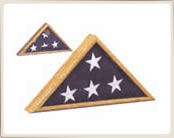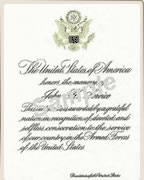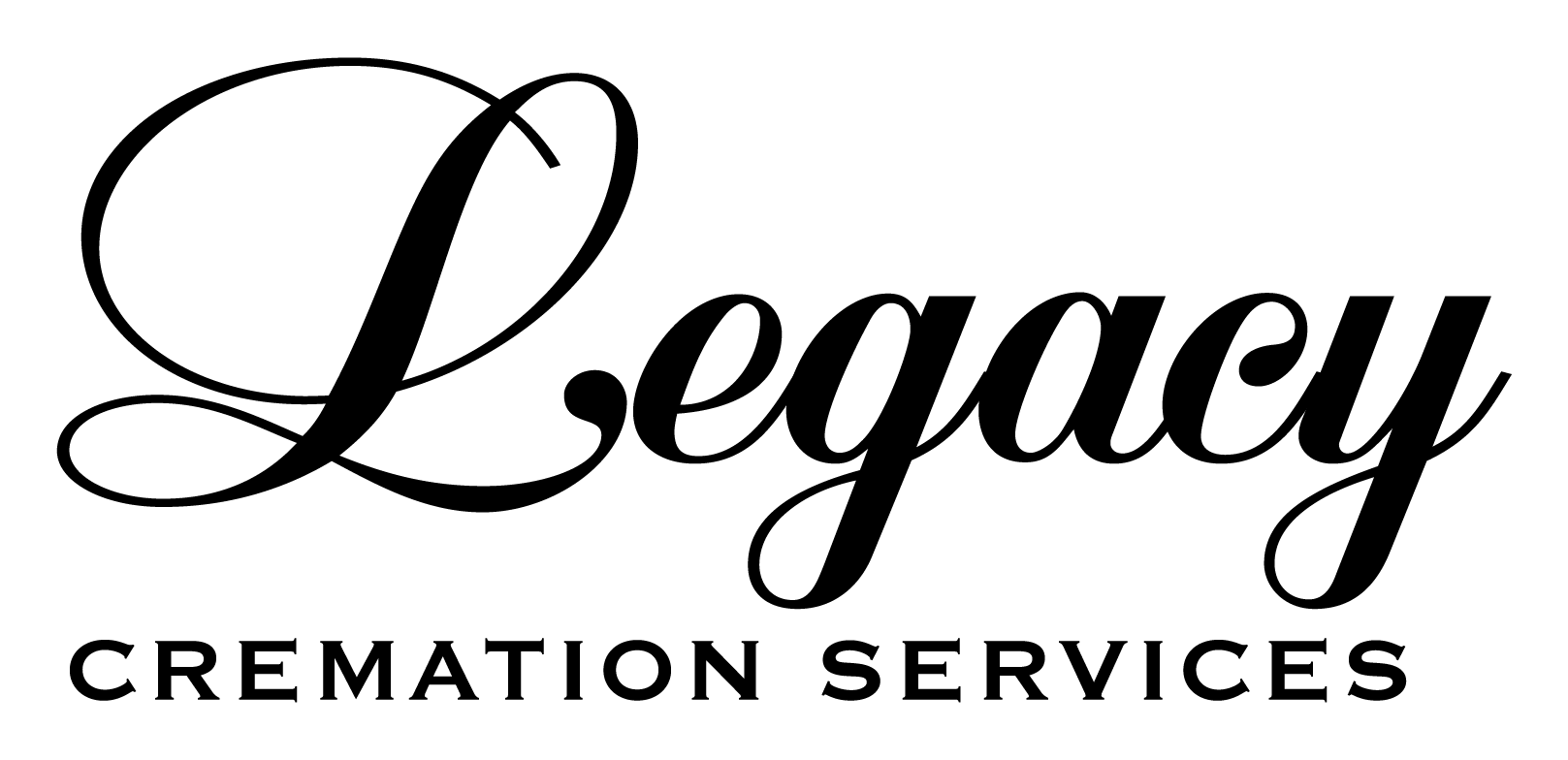- Who is Eligible?
- How Do You Apply?
- Reimbursement of Burial Expenses
- Burial Flags
- Burial in National Cemeteries VA Cemeteries
- Headstones and Markers
- Headstones or Markers for Memorial Plots
- Presidential Memorial Certificates

Who is Eligible?
To be eligible you must be a veteran discharged or separated from active duty under conditions other than dishonorable, and have completed the required period of service. U.S. Armed Forces members who die on active duty are also eligible, as are spouses and dependent children of eligible living and deceased veterans, and of current and deceased armed forces members. Contact the U.S. Department of Veterans Affairs at (800) 827-1000 for more information.
How Do You Apply?
Veterans benefits are not paid automatically. It is your responsibility to contact the Veterans Administration. To ensure prompt handling of your claim, have the following information ready:
- Social Security number for yourself and your dependent children
- Certified copy of original DD124 (Enlisted Record and Report of Separation)
- Certified copy of Death Certificate
- Verification of the life insurance amount you will receive as a result of the veterans death
- Paid receipts for hospital and doctor bills incurred by last illness, if applicable
- Paid receipts for funeral and cemetery expenses
- If either yourself or the veteran was previously married, provide a certified copy of the original divorce decree or death certificate proving the previous marriage was dissolved by divorce or death
- If there are dependent children, you will need an original birth certificate for each child under 18 or over 18 if full-time student
- If over 18 and still in school, you will need to fill out VA Form 21-674
- If you or the veteran receive Social Security Benefits, the exact amount must be reported
- If you already have a VA claim number, you must furnish the claim number you have been assigned
- If you or the veteran receive additional income, the source and exact amount must be reported
Reimbursement of Burial Expenses
 VA will pay a burial allowance up to $2,000 if the veteran’s death is service connected. VA also will pay the cost of transporting the remains of a service-disabled veteran to the national cemetery nearest the home of a deceased that has available gravesites. In such cases, the person who bore the veteran’s burial expenses may claim reimbursement from VA.
VA will pay a burial allowance up to $2,000 if the veteran’s death is service connected. VA also will pay the cost of transporting the remains of a service-disabled veteran to the national cemetery nearest the home of a deceased that has available gravesites. In such cases, the person who bore the veteran’s burial expenses may claim reimbursement from VA.
VA will pay a $300 burial and funeral expense allowance for veterans who, at time of death, were entitled to receive pension or compensation or would have been entitled to compensation but for receipt of military retirement pay. Eligibility also is established when death occurs in a VA facility or a nursing home with which VA contracted. Additional costs of transportation of the remains may be reimbursed. There is no time limit for filing reimbursement claims of service-connected deaths. In other deaths, claims must be filed within two years after permanent burial or cremation.
VA will pay a $300 plot allowance when the veteran is not buried in a cemetery that is under U.S. Government jurisdiction if the veteran is discharged from active duty because of disability incurred or aggravated in line of duty, if the veteran was in receipt of compensation or pension or would have been in receipt of compensation but for receipt of military retired pay, or if the veteran died while hospitalized by VA. The plot allowance is not payable solely on wartime service.
If the veteran is buried without charge for the cost of a plot or interment in a state-owned cemetery reserved solely for veteran burials, the $300 plot allowance may be paid to the state. Burial expenses paid by the deceased’s employer or a state agency will not be reimbursed.
Burial Flags
 VA provides an American flag to drape the casket of a veteran and to a person entitled to retired military pay. After the funeral service, the flag may be given to the next of kin or a close associate. VA also will issue a flag on behalf of a service member who was missing in action and later presumed dead. Flags are issued at VA regional offices, national cemeteries, and post offices.
VA provides an American flag to drape the casket of a veteran and to a person entitled to retired military pay. After the funeral service, the flag may be given to the next of kin or a close associate. VA also will issue a flag on behalf of a service member who was missing in action and later presumed dead. Flags are issued at VA regional offices, national cemeteries, and post offices.Burial in National Cemeteries VA Cemeteries
Burial benefits in a VA national cemetery include the gravesite, opening and closing of the grave, and perpetual care. Many national cemeteries have columbaria for the inurnment of cremated remains or special gravesites for the burial of cremated remains. Headstones and markers and their placement are provided at the government’s expense.
Veterans and armed forces members who die on active duty are eligible for burial in one of VA’s 114 national cemeteries. An eligible veteran must have been discharged or separated from active duty under honorable or general conditions and have completed the required period of service. Persons entitled to retired pay as a result of 20 years creditable service with a reserve component are eligible. A U.S. citizen who served in the armed forces of a government allied with the United States in a war also may be eligible.
Spouses and minor children of eligible veterans and of armed forces members also may be buried in a national cemetery. A surviving spouse of an eligible veteran who married a nonveteran, and whose remarriage was teminated by death or divorce, is eligible for burial in a national cemetery.
Gravesites in national cemeteries cannot be reserved. Funeral directors or others making burial arrangements must apply at the time of death. Reservations made under previous programs are honored. The National Cemetery System normally does not conduct burials on weekends. A weekend caller, however, will be directed to on eof three strategically located VA cemetery offices that remain open during weekends to schedule burials at the cemetery of the caller’s choice during the following week.
Headstones and Markers
 VA provides headstones and markers for the unmarked graves of veterans anywhere in the world and for eligible dependents of veterans buried in national, state veteran or military cemeteries.
VA provides headstones and markers for the unmarked graves of veterans anywhere in the world and for eligible dependents of veterans buried in national, state veteran or military cemeteries.
Flat bronze, flat granite, flat marble, upright granite and upright marble types are available to mark the grave in a style consistent with the place of burial. Niche markers also are available to mark columbaria used for inurnment of cremated remains.
Headstones and markers are inscribed with the name of the deceased, the years of birth and death, and branch of service. Optional items that also may be inscribed at VA expense are: military grade, rank or rate; war service such as World War II; months and days of birth and death; an emblem reflecting one’s beliefs; valor awards; and the Purple Heart. Additional items may be inscribed at private expense.
When burial is in a national, state veteran or military cemetery, the headstone marker is ordered through the cemetery, inscription, shipping and placement can be obtained from the cemetery.
When burial occurs in a cemetery other than a national, military post or state veterans cemetery, the headstone marker must be applied for from VA. It is shipped at government expense. VA, however, does not pay the cost of placing the headstone or marker on the grave. To apply, you must complete VA form 40-1330 and forward it to Director, Office of Memorial Programs (403A), National Cemetery System, Department of Veterans Affairs, Washington, DC 20420. Forms and assistance are available at VA application you may call the Director, Office of Memorial Programs at 1-800-697-6947.
VA cannot issue a headstone or marker for a spouse or child buried in a private cemetery. Twenty year reservists without active duty service are eligible for a headstone or marker, if they are entitled to military retired pay at the time of death.
Headstones or Markers for Memorial Plots
To memorialize an eligible veteran whose remains are not available for burial, VA will provide a plot and headstone or marker in a national cemetery. The headstone or marker is the same as that used to identify a grave except that the mandatory phrase “In Memory of” precedes the authorized inscription. The headstone or marker is available to memorialize eligible veterans or deceased active-duty members whose remains were not recovered or identified, were buried at sea, donated to science, or cremated and scattered. The memorial marker may be provided for placement in a cemetery other than a national cemetery. In such a case, VA supplies the marker and pays the cost of shipping, but does not pay for the plot or the placement of the marker. Only a relative recognized as the next of kin may apply for the benefit.
Presidential Memorial Certificates
 The Presidential Memorial Certificate is a parchment certificate with a calligraphic inscription expressing the nation’s recognition of the veteran’s service. The veteran’s name is inscribed and the certificate bears the signature of the President. Certificates are issued in the name of honorably discharged, deceased veterans. Eligible recipients include next of kin, other relatives and friends. The award of a certificate to one eligible recipient does not preclude certificates to other eligible recipients. The veteran may have died at any time in the past. The local VA regional office generally originates the application for a Presidential Memorial Certificate. The next of kin also may request a certificate. Requests should be accompanied by a copy of a document such as a discharge to establish honorable service. VA regional offices can assist in applying for certificates.
The Presidential Memorial Certificate is a parchment certificate with a calligraphic inscription expressing the nation’s recognition of the veteran’s service. The veteran’s name is inscribed and the certificate bears the signature of the President. Certificates are issued in the name of honorably discharged, deceased veterans. Eligible recipients include next of kin, other relatives and friends. The award of a certificate to one eligible recipient does not preclude certificates to other eligible recipients. The veteran may have died at any time in the past. The local VA regional office generally originates the application for a Presidential Memorial Certificate. The next of kin also may request a certificate. Requests should be accompanied by a copy of a document such as a discharge to establish honorable service. VA regional offices can assist in applying for certificates.